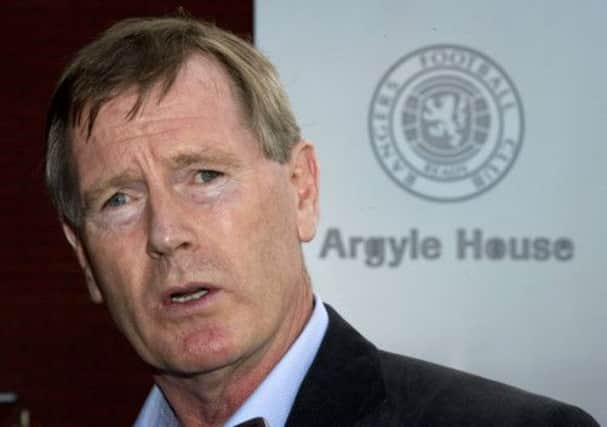Comment: Hopes of crowning King at Ibrox premature


Given the club’s wretched recent history with would-be redeemers, it is also a shade of odds-on to be premature.
There is no evidence to suggest that the South Africa-based Glaswegian carries the kind of risk that comes with allowing another carpet-bagger into the constituency, but there are complications and obstacles that should make anyone with an open mind question the reliability of reports that he is on the brink of assuming the chairmanship and transforming Rangers’ financial position with a mountain of cash.
Advertisement
Hide AdAdvertisement
Hide AdThe stream of blithe assurances from some quarters that the wooing of King by the Ibrox chief executive, Craig Mather, had borne fruit was abruptly interrupted in mid-flow by the more convincing comments of the most significant figure to have contributed so far to the story.
Alastair Johnston, the former Rangers chairman and a long-standing friend of King, effectively confirmed what the latter has confided to various people in recent times; namely, that the only circumstances in which he would return would be to assume charge (that is, ownership) of the club.
While in no doubt that King’s business acumen would be richly beneficial to Rangers, Johnston expanded: “As far as his filling the vacant chairman’s role is concerned, I’m not sure how much authority the chairman has right now.
“Dave is not going to go in there in any circumstance where he doesn’t have control. He stayed on the board when Craig Whyte tried to get him off it, simply because of an obstinacy and a certain leverage he brought to bear on Craig Whyte. But the bottom line is at the end of the day if Dave can’t see the role of chairman as being anything more than a figurehead, then I don’t think he’ll be interested.”
Men of King’s reputed wealth are not renowned for handing £20 million of their cash reserves to others to manage, as he did when he invested that amount in David Murray’s regime and it turned to dust. It is a myth, too, that King lost his stake when Rangers descended into administration; the shares were virtually worthless long before, as the Joe Lewis-owned, Daniel Levy-run English National Investment Company were also on their way to discovering. ENIC, like the former director Hugh Adam, sold their holding before it hit the floor, but recovered only £8 million of their original £40m. The consequence of that misadventure is that King is extremely unlikely to repeat the folly.
In order to be assured of autonomy in the matter of running the business, he would have to buy a controlling interest, or at least 51 per cent of the stock. If he does so by purchasing from existing shareholders, the money does not go to the club, but to the vendors of the shares. To put money into the club, therefore, King would have to acquire his holding through newly-issued shares.
That would result in present shareholders having their percentage significantly reduced, and it is legitimate to wonder how that prospect would be received by such ambitious executives as the Easdale brothers, Sandy and James, as well as any of the others with relatively large holdings. The coach company operators surely did not buy the right to claim that Sandy is the biggest individual shareholder in the company just to have their interest suddenly diluted almost to the point of meaninglessness.
Furthermore, if King were to acquire even 30 per cent of the equity, he would be obliged to offer every shareholder the opportunity to sell – and at a price that would make it worth their while. That is a dangerous strategy, because it risks the possibility of coming close to having to pay for 100 per cent of the shares. All of this could cost in excess of £31m (Rangers’ valuation on the stock market) with the money going into the sellers’, rather than the club’s, bank accounts.
Advertisement
Hide AdAdvertisement
Hide AdNone of these potential hazards, of course, should be regarded at this stage as insurmountable. But they are enough of an obstacle to warrant a certain scepticism over the claim that King will be in the chair – flanked by a smugly confident present board of directors – by the time of the potentially explosive annual meeting in just 12 days‘ time.
A Jag in the tail for Shankly
The occasion of Bill Shankly’s 100th birthday recently triggered a few reminiscences in various places. But there could have been a special knees-up at Firhill Stadium had anyone on the staff been old enough to remember the great man’s wartime service with Partick Thistle.
This was occasioned by his temporary posting to RAF Bishopbriggs on the outskirts of Glasgow – and by the decree of the omnipotent secretary of the Scottish Football Association, Sir George Graham. What very few people know was that Shanks had deliberately requested the transfer to Bishopbriggs so that he could fulfil an ambition to play for Rangers, even if only as a wartime guest.
His application, however, got no further than the desk of Sir George, who loftily informed Bill – by then already a regular in the Scotland team – that if he intended to guest for any club, he was obliged to do so for the one nearest his posting. In this case, he was assured, it would not be Rangers, but the (slightly) less exotic Jags. There was, however, one matchless compensation about his billeting in Bishopbriggs – it was where he met his wife, Nessie, a member of the WAAF in the same station.